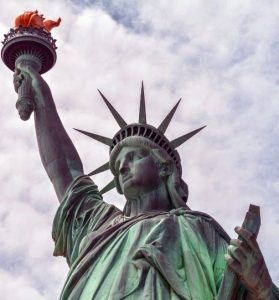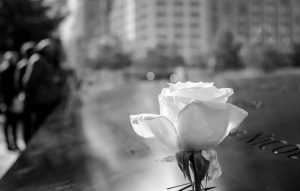Home » Posts tagged 'social class'
Tag Archives: social class
Voting Is Radical
 If you have not already voted – you are undecided, disillusioned, resentful or just plain tired of it all – realize that people like you who care about class justice must vote. It is an act of resistance. Why?
If you have not already voted – you are undecided, disillusioned, resentful or just plain tired of it all – realize that people like you who care about class justice must vote. It is an act of resistance. Why?
When the U.S. Constitution was adopted on June 21, 1788, voting was left to the states. With rare exception, only white Anglo-Saxon Protestant males, who own property and were older than 21 were allowed to vote.* So, only those with extreme class advantage were given this right, one that many of us have taken for granted for decades now.
But most of us also know that the right to vote was doled out to those of us with limited class advantage slowly and painfully. Black men were “allowed” to vote in 1870 but racist AND classist obstacles like poll taxes and literacy tests (even in states like Connecticut) kept most from doing so for generations. Of course, henchmen for the owning classes meted out violence on Black men with some class advantage who tried to vote.
It took until 1920 for women to “earn” the opportunity to vote, but Black women in many southern states were not able to vote until many years later. According to History.com:
“Native Americans—both men and women—did not gain the right to vote until the Snyder Act of 1924, four years after the ratification of the 19th Amendment and more than 50 years after the passage of the 15th Amendment. Even then, some Western states, including Arizona, New Mexico and Utah, didn’t grant Native Americans the right to vote until the 1940s and ‘50s. It wasn’t until the Cable Act of 1922 that women were allowed to keep their citizenship – and gain the right to vote – if they were married to an immigrant (who had to be eligible to become a U.S. citizen).
In Puerto Rico, literate women won the right to vote in 1929, but it wasn’t until 1935 that all women were given that right. Realize that literacy tests were extremely difficult to pass.**
And Asian American immigrant women were denied the right to vote until 1952 when the Immigration and Nationality Act allowed them to become citizens.”
If this does not convince you that voting is radical, you know that there are those with great class privilege in the United States who are using every advantage they have right now, money, access to media and social media, connections and more, to keep the rest of us from voting. According to the Brennan Center, states have added almost 100 laws restricting voting since the Voting Rights Act was rendered nearly toothless a decade ago.
I know you share UU Class Conversations’ passion for class justice and an end to classism. So, voting is something you must do, right? Happy voting. And thank you for ensuring that this right continues with people who care about it as much as you do
* A few states allowed free Black men to vote, and New Jersey also included unmarried and widowed women who owned property.
** https://www.history.com/news/19th-amendment-voter-suppression
Remembering 9/11: Forgetting None
 As we remember the terrible devastation, sorrow and inhumanity those many years ago on 9/11, let’s also remember how people and institutions came together around the world to support one another on that day and since. Let’s remember also how our own Unitarian Universalist organizations, the UU Service Committee and UU Association, together raised funds from members/congregants across the country to support the families and loved ones of 9/11 victims who would not receive support from “traditional” charities.
As we remember the terrible devastation, sorrow and inhumanity those many years ago on 9/11, let’s also remember how people and institutions came together around the world to support one another on that day and since. Let’s remember also how our own Unitarian Universalist organizations, the UU Service Committee and UU Association, together raised funds from members/congregants across the country to support the families and loved ones of 9/11 victims who would not receive support from “traditional” charities.
Undocumented workers’ families were ineligible for support from the government and many charities – even when the victims were the sole support of the family. Because of their status, undocumented workers had toiled in the shadows of the Twin Towers in obscurity, and families had no proof that the worker had held a job. Additionally, the families lacked the class advantage that could open doors to their new country’s legal system.
In 2001, legal marriage was not yet available for lgbtq+ individuals. Without a marriage license, the partners of 9/11 victims and their children were often ineligible for support from most organizations. The UU Service Committee worked with immigrant rights and lgbtq+ groups on the ground in New York City, Washington, D.C. and Pennsylvania to make sure that classism and other forms of bias could not keep families from receiving the help and support they needed.
Additionally, UUSC continued to support those affected by the tragedy. For example, it funded clinics addressing the rise in respiratory illnesses in communities of color that were in the direct path of the massive dust clouds that filled the air following the towers’ collapse. And, of course, individual UU congregations and groups were on the front lines to support 9/11 survivors and families in the immediate aftermath and beyond.
So, as we remember the events of 9/11, let us remember also to continue the fight against classism and bias. And, as UUs, let us continue to press for lgbtq+, BIPOC and immigrant rights – all under attack from organized internal forces. Remember everyone!

